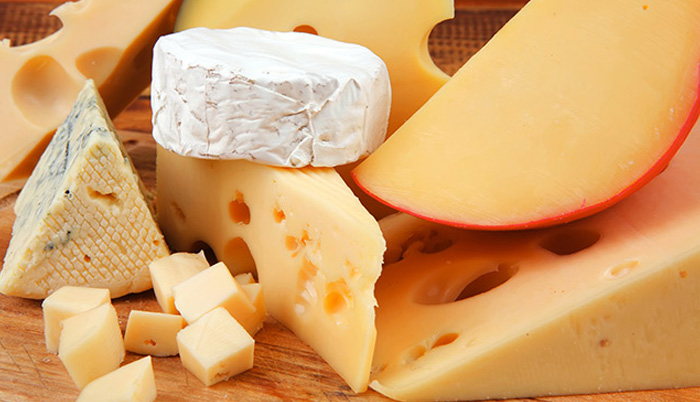![]() Home > Health
Home > Health
Study Shows Antioxidants In Cheese Can Protect Blood Vessels From Salt Damage

![]() July 21st, 2022 | 16:59 PM |
July 21st, 2022 | 16:59 PM | ![]() 807 views
807 views
NATURALNEWS
Experts often warn against eating too much cheese because it’s high in calories and fat. But according to a study conducted by researchers from the Pennsylvania State University, certain antioxidants naturally found in cheese may help protect blood vessels from damage caused by a high-salt diet.
The study was published in the Journal of Nutrition.
In a randomized, crossover design study supported by the National Dairy Council, the researchers found that when adults consume a high sodium diet, they also experience blood vessel dysfunction. But consuming four servings of cheese a day alongside a high sodium diet seems to reverse this effect.
Sodium is an essential mineral, but your body only needs it in small doses. At the same time, the consumption of too much dietary sodium is linked to cardiovascular risk factors like high blood pressure. The American Heart Association recommends consuming only 2,300 milligrams (mg) of sodium per day.
The ideal amount is closer to 1,500 mg for most adults.
For the study, the research team worked with 11 adults without salt-sensitive blood pressure. The volunteers followed four separate diets for eight days at a time:
A low-sodium, no-dairy diet
A low-sodium, high-cheese diet
A high-sodium, no-dairy diet
A high-sodium, high-cheese diet
While on the low-sodium diets, the volunteers only consumed 1,500 mg of salt a day. And while on the high sodium diets, they consumed 5,500 mg of salt per day.
While on the cheese diet, they consumed at least 170 grams or about four servings of several different types of cheese a day.
At the end of each diet period, the volunteers were told to report to the lab for testing. The researchers then inserted tiny fibers under the participants’ skin and applied a small amount of the drug acetylcholine, a compound that signals blood vessels to relax.
After the procedure, the researchers examined how each participant’s blood vessels reacted to the drug. They also measured the participants’ blood vessel function.
Additionally, the participants underwent blood pressure monitoring and provided a urine sample so the researchers could confirm that they had been consuming the correct amount of salt throughout the week.
Results showed that after a week on the high-sodium, no-cheese diet, the participants’ blood vessels didn’t respond well to acetylcholine, which is specific to specialized cells in blood vessels. The participants’ blood vessels had a difficult time relaxing.
In contrast, the researchers observed the opposite in participants who ate the high-sodium, high-cheese diet.
The research team explained that it is crucial to continue studying these effects in larger studies and the possible mechanisms through which dairy foods may preserve vascular health.
Health benefits of cheese
Contrary to popular belief, cheese can be good for you. However, the best way to enjoy the health benefits of cheese is by consuming it moderately.
Cheese is considered a whole food, which is generally good for your health as long as you don’t eat too much.
Here are some reasons to add cheese to a balanced diet:
Cheese is nutritious
Cheese is full of nutrients like calcium, fat and protein. It also contains high amounts of vitamins A and B12, and nutrients like phosphorus, riboflavin and zinc.
According to U.S. Dairy, the overall nutritional profile of conventional, organic and grass-fed dairy products is similar.
Grass-fed cheese is made from the milk of 100 percent grass-fed animals. A diet high in grass-fed dairy may provide a healthier balance of omega-6 and omega-3 fatty acids than diets that include conventional dairy.
Omega-3 fats are important for your heart and metabolic health.
Grass-fed dairy products cost more than standard versions and some individuals may choose to purchase them for their higher omega-3 content. However, more research is needed to verify if this difference in nutrients is large enough to have significant benefits in an average U.S. diet.
Cheese can help protect your teeth from cavities
According to some studies, cheese, and dairy products, in general, can help protect your teeth from cavities.
Data from a 2015 Danish study, showed children with an above-average dairy intake were more likely to be cavity-free after three years compared to kids with a below-average intake.
Cheese is a source of conjugated linoleic acid (CLA)
High-fat cheeses like blue cheese, Brie and cheddar contain small amounts of conjugated linoleic acid (CLA).
CLA is a healthy fat that may help prevent obesity and heart disease. CLA may also help reduce inflammation.
Data shows that cheddar cheese sourced from 100 percent grass-fed animals contained twice as much CLA as conventional cheddar. But experts explained that it’s not clear whether switching to grass-fed cheese would have overall nutritional benefits in an average U.S. diet.
Source:
courtesy of NATURALNEWS
by Zoey Sky
If you have any stories or news that you would like to share with the global online community, please feel free to share it with us by contacting us directly at [email protected]